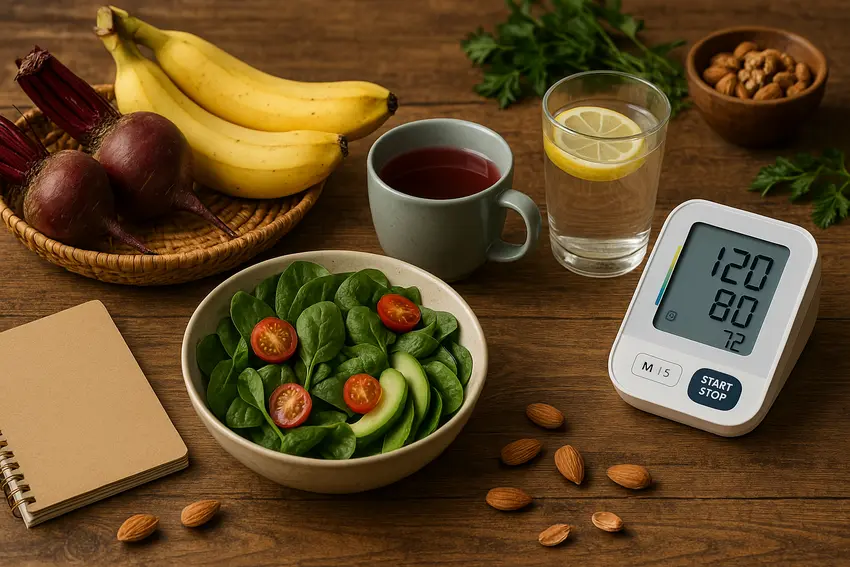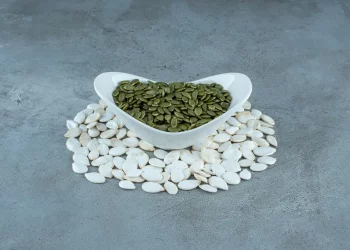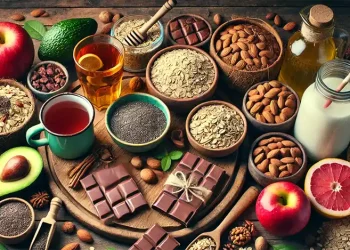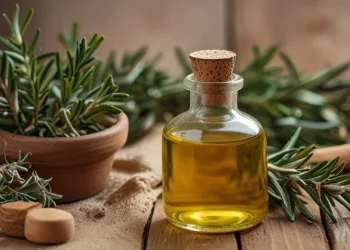Blood pressure is the force of blood pushing against the walls of your arteries as your heart pumps. Maintaining healthy blood pressure is vital for overall well-being. When blood pressure becomes consistently high (hypertension) or low
(hypotension), it can impact your health.
High blood pressure is often asymptomatic, earning it the nickname “the silent killer.” Many individuals seek ways to manage their blood pressure through lifestyle adjustments. This article explores some general lifestyle and dietary changes that can
contribute to maintaining healthy blood pressure levels.
Understanding Blood Pressure
Before exploring supportive measures, let’s briefly define what it is. Blood pressure represents the force of blood pushing against the walls of your arteries as your heart circulates it throughout your body. It’s measured in millimeters of mercury (mmHg) and is expressed as two numbers: systolic pressure (the pressure during a heartbeat) over diastolic pressure (the pressure when the heart rests between beats). A typical healthy reading is around 120/80 mmHg. Values exceeding this range may indicate elevated or high blood pressure.
Why Healthy Blood Pressure Matters ?
Maintaining healthy blood pressure is crucial for preventing serious health issues such as heart disease, stroke, and kidney problems. Adopting certain lifestyle and dietary habits can play a supportive role in managing blood pressure.
Dietary Considerations: Nourishing Your Body
Your diet can significantly influence your blood pressure. Consider incorporating these elements:
1. Potassium-Rich Foods: Potassium helps balance sodium levels in the body and may help ease tension in blood vessel walls. Good sources include bananas, sweet potatoes, and spinach.
Try It : Bananas, Sweet Potatoes, Spinach
2. Magnesium-Packed Options: Magnesium plays a role in relaxing blood vessels. Include foods like almonds, avocados, and dark chocolate (in moderation, with a high cocoa content of 70% or more).
Try It : Almonds, Avocados, Dark Chocolate
3. Foods Containing Nitric Oxide: Nitric oxide helps dilate blood vessels, which can contribute to healthier blood flow. Beets, arugula, and pomegranate are sources of compounds that the body can convert to nitric oxide.
Try It : Beets, Arugula, Pomegranate
4. Limit Sodium and Processed Foods: High sodium intake can contribute to elevated readings. Be mindful of the sodium content in processed snacks, canned goods, and restaurant meals. Aim for a generally low sodium intake, as advised by health guidelines. Reading food labels can help you make informed choices.
5. Hydration: Adequate water intake is important for maintaining healthy blood volume, which supports healthy circulation. Aim for sufficient daily fluid intake.
These dietary adjustments can be a supportive part of a healthy lifestyle for managing your cardiovascular well-being.
Lifestyle Adjustments: Habits for Well-being
Your daily habits can significantly impact your blood pressure:
1. Stress Management: Chronic stress can negatively affect blood pressure. Incorporate stress-reducing practices such as deep breathing exercises, meditation, or gentle activities like yoga into your routine.
Do it : Deep Breathing, Meditation, Yoga
2. Regular Physical Activity: Engaging in regular physical activity helps improve circulation and can contribute to healthier readings. Aim for at least 150 minutes of moderate-intensity exercise per week, such as brisk walking or gardening.
3. Adequate Sleep: Sufficient sleep allows your body to regulate various functions, including the maintenance of healthy readings. Aim for 7-9 hours of quality sleep per night. Establishing a relaxing bedtime routine, such as avoiding screens before bed and drinking herbal tea (non-caffeinated), can be beneficial.
4. Limit Alcohol and Caffeine: Excessive consumption of alcohol and caffeine can temporarily raise readings. Moderation is key. Consider limiting your intake of these substances.
5. Quit Smoking: Smoking damages blood vessels and significantly increases blood pressure. Quitting smoking is one of the most beneficial steps you can take for your cardiovascular health. Resources are available to help individuals quit.
These lifestyle adjustments can be powerful tools in supporting healthy circulatory function.
Herbal and Natural Remedies: A Word of Caution
Some natural remedies, such as garlic, hawthorn, and hibiscus tea, are sometimes suggested for blood pressure management. While some studies show potential benefits, it is crucial to consult with your doctor before using any herbal or natural remedies,
especially if you have existing health conditions or are taking medications. These remedies may interact with medications or have other potential side effects. Self-treating with herbal remedies alone for high blood pressure is not recommended and can be dangerous.
Practical Tips for Consistency
Making lasting changes takes time and effort:
- Start Gradually: Introduce changes to your diet and lifestyle incrementally rather than all at once.
- Monitor Your Progress: Keeping a record of your food intake and activity levels can help you stay motivated and identify patterns.
- Seek Support: Engaging family or friends in your healthy habits can provide encouragement and make it more enjoyable.
When to Seek Medical Advice
While lifestyle adjustments can be supportive, they are not a substitute for professional medical care. It is essential to consult a doctor for the diagnosis and management of high or low blood pressure.
Seek immediate medical attention if you experience any of the following symptoms:
- Severe headache
- Chest pain
- Shortness of breath
- Severe dizziness or lightheadedness
- Nausea or Vomiting
- Sudden changes in vision (blurred vision)
- Numbness or weakness in the face, arm, or leg
- Difficulty speaking
Regular monitoring is important. If you have been diagnosed with high or low blood pressure, follow your doctor’s recommendations for medication, lifestyle changes, and regular check-ups.
If your blood pressure readings are consistently above 140/90 mmHg or consistently below 90/60 mmHg, even with home remedies, it is crucial to consult with a healthcare professional. They can provide an accurate diagnosis, recommend appropriate
treatment options, and monitor your condition effectively.
Conclusion
Managing your blood pressure doesn’t have to be complicated or solely reliant on medication. By incorporating these easy home remedies and making lifestyle changes, you can take control of your health and work towards maintaining healthy blood pressure levels. Remember, consistency is key, and small changes can lead to significant improvements over time. So, start today, and take the first step towards a healthier you!
Disclaimer:
Please note that Well Health Organic is not responsible or guarantees the accuracy, completeness, or safety of the information and details provided in this article. This article provides general information about lifestyle adjustments that may support healthy blood pressure. It is not intended to be a substitute for professional medical advice, diagnosis, or treatment. Always seek the advice of your physician or other qualified health provider with any questions you may have regarding a medical condition. Never disregard professional medical advice or delay in seeking it because of something you have read in this article. Reliance on any information provided in this article is solely at your own risk.



















